Related Research Articles

Southern Rhodesia was a landlocked, self-governing British Crown colony in Southern Africa, established in 1923 and consisting of British South Africa Company (BSAC) territories lying south of the Zambezi River. The region was informally known as South Zambesia until annexation by Britain, at the behest of Cecil Rhodes's British South Africa Company. The bounding territories were Bechuanaland (Botswana), Northern Rhodesia (Zambia), Portuguese Mozambique (Mozambique) and the Transvaal Republic.

The stone-carved Zimbabwe Bird is the national emblem of Zimbabwe, appearing on the national flags and coats of arms of both Zimbabwe and former Rhodesia, as well as on banknotes and coins. It probably represents the bateleur eagle or the African fish eagle. The bird's design is derived from a number of soapstone sculptures found in the ruins of the medieval city of Great Zimbabwe.
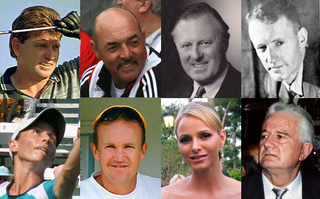
White Zimbabweans, also known as White Rhodesians or simply Rhodesians, are a Southern African people of European descent. In linguistic, cultural, and historical terms, these people of European ethnic origin are mostly English-speaking descendants of British settlers. A small minority are either Afrikaans-speaking descendants of Afrikaners from South Africa or those descended from Greek, Portuguese, Italian, and Jewish immigrants.

Prince Edward School is a public, boarding and day school for boys aged 13 to 19 in Harare, Zimbabwe. It provides education facilities to 1200+ boys in Forms I to VI. The school is served by a graduate staff of over 100 teachers.
The Hon. Lionel Cripps, CMG, was the first Speaker of the Southern Rhodesian Legislative Assembly.
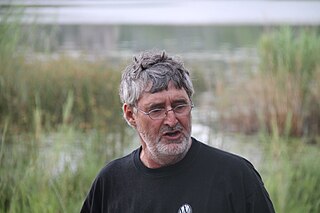
John Eppel is a Zimbabwean short story writer, novelist and poet. In 1990 he was awarded the Ingrid Jonker Prize for his poetry volume, "Spoils of War", detailing his experiences as a soldier in the Rhodesian Bush War.
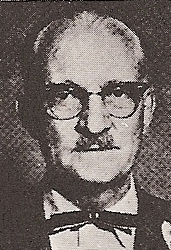
Desmond William Lardner-Burke was a Rhodesian lawyer and politician.
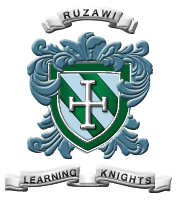
Ruzawi School is an Anglican, independent, co-educational, preparatory, boarding school for children aged 6 to 12. It is located near the town of Marondera in Zimbabwe. Ruzawi, which was founded by Robert Grinham and Maurice Carver, has a pupil population ranging from 205 to 220 depending on the balance of boys and girls and the number of pupils in each age group. In the Infants' Department there is one class each for Grade One and Grade Two. An additional entry point at Grade Three enables there to be two classes from that level up to Grade 7. The school is situated some five kilometres south of Marondera in extensive grounds surrounded by many hectares of indigenous miombo woodland and exotic eucalyptus plantations.

The history of the Jews in Zimbabwe reaches back over one century. Present-day Zimbabwe was formerly known as Southern Rhodesia and later as Rhodesia.
Leonard Ray Morgan (1894–1967) was the first permanent Secretary for Education in the Federation of Rhodesia and Nyasaland.
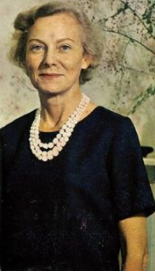
Janet Duvenage Smith, was the wife of Ian Smith, Prime Minister of Rhodesia from 1964 to 1979. Born in Cape Town, South Africa, she studied history at the University of Cape Town and became a teacher. In 1942, she married Piet Duvenage, a rugby player, and had two children. He died in an accident on the rugby field in 1947. The next year, a short visit with family in Southern Rhodesia became permanent when she accepted a teaching job in Selukwe. There, she met her future husband, Ian Smith, who had recently come home from the Second World War. In 1948, the couple got married and bought a farm, and Ian was elected to the Southern Rhodesian Legislative Assembly.
The Baptist Convention of Zimbabwe is a Baptist Christian denomination in Zimbabwe. It is affiliated with the Baptist World Alliance and the Evangelical Fellowship of Zimbabwe. The headquarters is in Gweru.
Neil Housman Wilson (1886–1960) was an English-born Southern Rhodesian journalist and politician who became a member of the Southern Rhodesian parliament in 1933.
Peter William Hewlett is a Zimbabwean farmer and politician who served as a member of Parliament in the House of Assembly from 1990 to 2000. A member of ZANU–PF, he represented the Zhombe and Kwekwe North constituencies.

David Colville Smith was a farmer and politician in Rhodesia and its successor states, Zimbabwe Rhodesia and Zimbabwe. He served in the cabinet of Rhodesia as Minister of Agriculture from 1968 to 1976, Minister of Finance from 1976 to 1979, and Minister of Commerce and Industry from 1978 to 1979. From 1976 to 1979, he also served Deputy Prime Minister of Rhodesia. He continued to serve as Minister of Finance in the government of Zimbabwe Rhodesia in 1979. In 1980, he was appointed Minister of Trade and Commerce of the newly independent Zimbabwe, one of two whites included in the cabinet of Prime Minister Robert Mugabe.
State House, formerly known as Government House, is the official residence of the President of Zimbabwe and is located in Harare, Zimbabwe. It was previously used by the Administrator of Southern Rhodesia, Governor of Southern Rhodesia and the Governor-General of the Federation of Rhodesia and Nyasaland in addition to being occupied by the internationally unrecognised Rhodesian Officer Administering the Government and later President of Rhodesia. It was constructed in 1910 to a design by Detmar Blow in the Cape Dutch revival style.
Zimbabwean literature is literature produced by authors from Zimbabwe or in the Zimbabwean Diaspora. The tradition of literature starts with a long oral tradition, was influenced heavily by western literature during colonial rule, and acts as a form of protest to the government.
Colin Style was a British-Zimbabwean poet and writer. He was awarded the Ingrid Jonker Prize for best published collection in English in Southern Africa, 1977 with Baobab Street (1977).
Dorothy Elizabeth "Betty" Finn, néeBorrell was a British teacher and poet in Southern Rhodesia. She published poetry as D. E. Borrell, and other writing as D. E. Finn.
References
- 1 2 3 13. White Rhodesian Poetry Columbia University Press. 2007
- 1 2 3 4 5 6 7 8 9 10 11 12 13 The poetry of N.H. Brettell : a critical edition Rhodes University. 2006
- ↑ Poetry in Rhodesia University of Rhodesia. 1978
- ↑ SCENES OF FAMILY LIFE IN RHODESIA AND SOUTH AFRICA DURING THE PERIOD OF UNILATERAL INDEPENDENCE [Allocated Title] Imperial War Museum. Retrieved on 1 October 2023